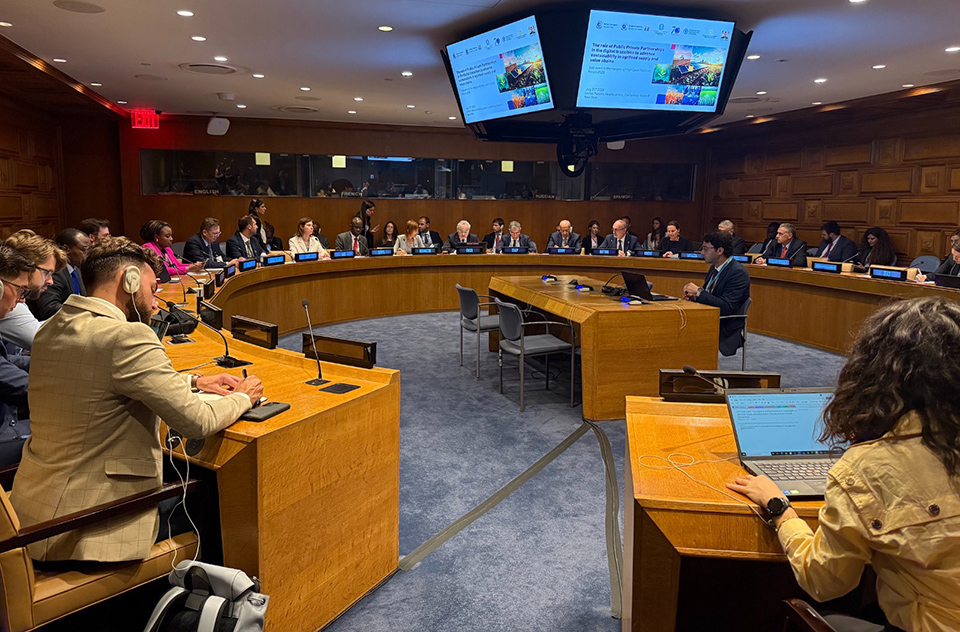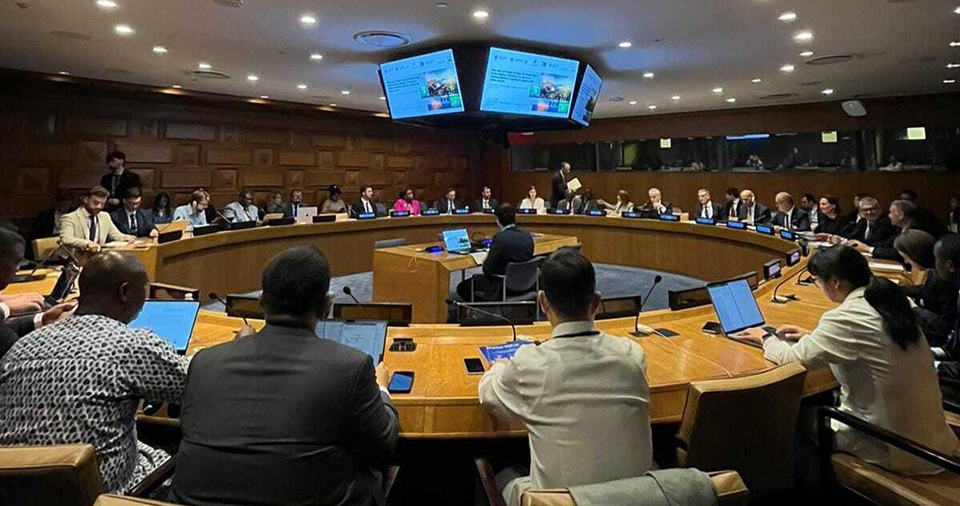The digital transition can and must become a tool for accelerating sustainability in agrifood supply chains, helping to make production systems more equitable, inclusive, and resilient. To achieve this goal, it is crucial that businesses adopt a strategic approach to digitalization, consistent with the Objectives of the 2030 Agenda of the United Nations and supported by effective public-private partnerships. This is the message shared by UN Global Compact Network Italy and the Permanent Mission of Italy to the United Nations during the side event organized in the margins of the High-Level Political Forum (HLPF), held on July 21 in New York.
The agrifood sector is currently facing important challenges for global prosperity and well-being. According to the FAO, by 2050 it will be necessary to produce 50% more food to feed a world population that will exceed 9 billion people. This goal comes in a context marked by growing scarcity of natural resources, climate change, and geopolitical instability, which undermine access to healthy and affordable food. In this scenario, transforming agrifood systems to be sustainable, resilient, and inclusive is a priority that requires the synergistic collaboration of businesses, public institutions, and financial actors.
The digital transition is a strategic lever for radically rethinking agrifood value chains. According to the 2023 SDG Digital Acceleration Agenda, digital solutions can contribute to achieving over 70% of the 2030 Agenda targets, particularly in the areas of combating climate change, fighting hunger, education, and reducing poverty. However, the transformative potential of digitalization must be accompanied by constant attention to the issue of inequality, in order to avoid the exclusion of less digitized agricultural communities, people with limited digital skills, and small and medium-sized enterprises without adequate infrastructure.
“We know that to eliminate hunger and achieve food security for the expanding global population – 9.8 billion people by 2050 – we must ensure access to safe, nutritious and affordable food for everyone, now and in the future. Long-term progress depends on prioritizing workers, reducing waste and pollution, and protecting the natural ecosystems that sustain us all. New digital technologies, including artificial intelligence (AI), have enormous potential to transform the way the world produces food. Digital technologies can increase sustainability across the food value chain. From collecting real-time information on soil conditions and weather patterns to predicting crop yields, AI can help food producers optimize limited resources. But in order to harness the full potential of digital technologies, they must be responsibly developed and applied” declared Sanda Ojiambo, Assistant Secretary-General and CEO, United Nations Global Compact, on the occasion of the side event in the margins of the High-Level Political Forum.
"It is crucial to adopt a systemic approach to digital transition, in which innovation and sustainability are mutually reinforcing. Businesses are called upon to integrate technological transformation into their business models in a strategic way, moving toward solutions which are capable of generating shared value and are measurable according to ESG criteria. The responsible adoption of digital technologies must become a unique feature of the private sector, which is called upon to drive change under the values of transparency, ethics and inclusion. In particular, digitalization can be critical for agrifood supply chains to address risks at the social and environmental levels, enabling businesses to adopt appropriate verification and control systems along supply chains" said Filippo Bettini, Chairman of UNGCN Italy.
"While digital innovation holds immense potential to improve productivity and efficiency, Italy recognizes the multi-dimensional challenges. Through our development cooperation programs and partnerships with the African Union and Mediterranean countries, we are investing in digital literacy, rural connectivity, and innovation ecosystems, to ensure that smallholder farmers, indigenous peoples, and marginalized communities are not left behind but are empowered to co-design and co-own digital solutions. Italy is determined to promote a fair, inclusive, and sustainable digital transformation in agrifood systems as we are convinced that technology must serve the needs of people, the environment and future generations" said Claudio Barbaro, Undersecretary of State for the Environment and Energy Security, Italy.

During the event, Filippo Bettini also announced the upcoming publication, scheduled for October, of a position paper developed with the contribution of 47 Italian companies participating in the UN Global Compact. The document will analyze the risks and opportunities associated with digitalization and the use of artificial intelligence, through case studies and concrete experiences gained by the private sector.
"The promotion of multi-stakeholder partnerships between the public and private sectors is crucial to accompany an equitable and sustainable digital transformation of agrifood systems. At the same time, there is a need for solid institutional support - at the national, European and global levels - that ensures access to digital infrastructure, technical training pathways and enabling conditions (including in terms of investment) for the digital growth of businesses, by combining strategic and technical expertise of the major players in a holistic vision of country-system initiatives. Only in this way, digital transition can be a driving force of inclusion and competitiveness, in line with the concept of twin transition proposed by the European Union." said Daniela Bernacchi, Executive Director of UNGCN Italy.
In her speech, Angélica Jácome, Director of the FAO Liaison Office with the UN said: “The future of our agrifood systems depends on our ability to work together - across sectors, across borders, and across the digital divide - to ensure that digital transformation leaves no one behind."
“The ACT programme reflects a new model of development cooperation — one built on strong public-private partnerships. By uniting governments, industry, and international actors, the programme aims to create a resilient and sustainable coffee sector that delivers real impact for African producers and communities” affirmed Virpi Stucki, Chief of the Division for Fair Production, Sustainability Standards and Trade, UNIDO.
The event was moderated by the Permanent Representative of Italy to the United Nations, Ambassador Maurizio Massari, who concluded the proceedings by emphasizing the importance of the discussion in light of the second “United Nations Food Systems Summit Stocktaking,” which will be co-organized by Ethiopia and Italy in Addis Ababa from July 27 to 29, to address the issues of international collaboration, finance, and investment to accelerate the transformation of food systems at the global level.

